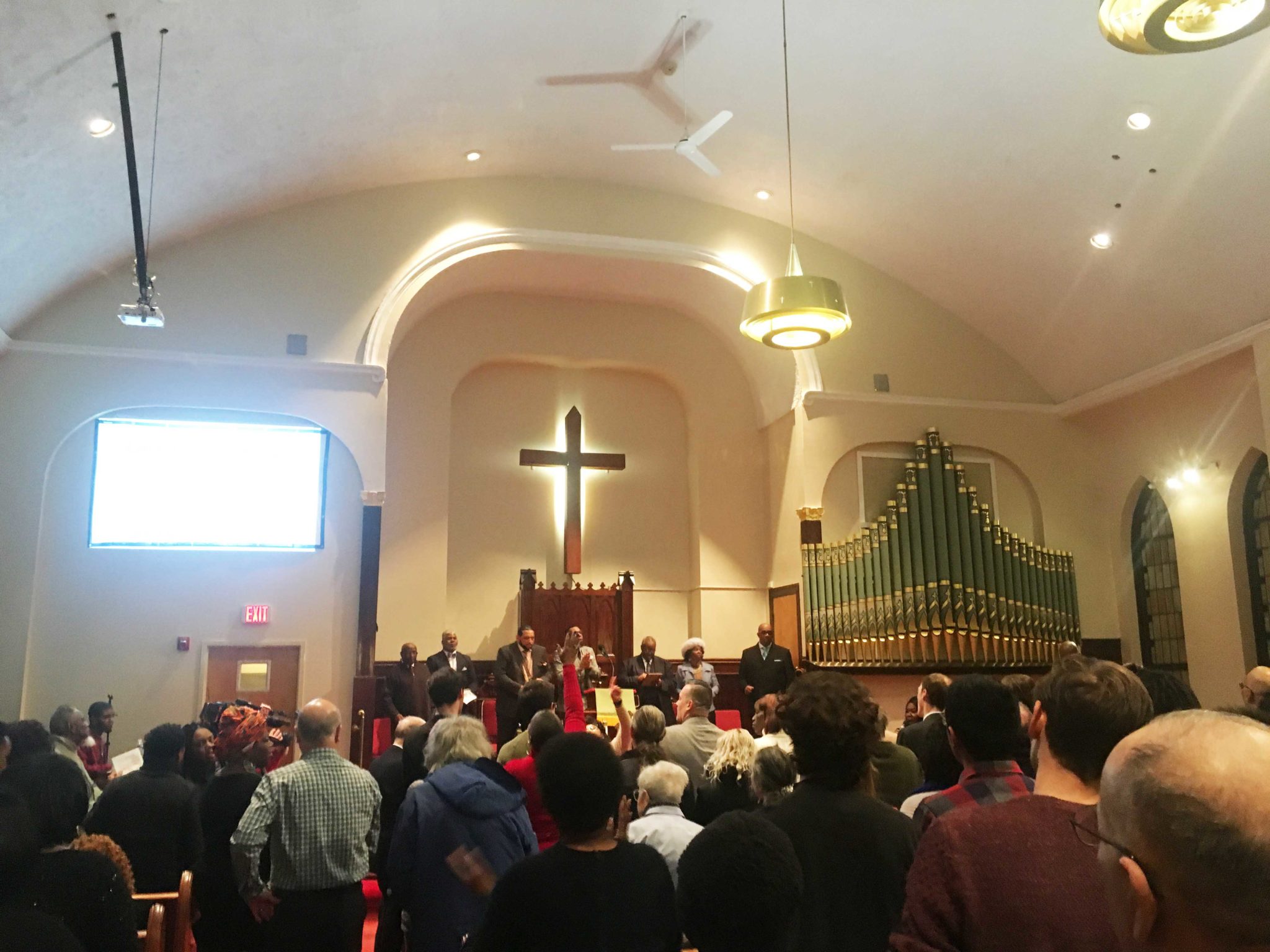
On Monday night, New Haveners of varying affiliations and backgrounds packed into the pews of Varick Memorial African Methodist Episcopal Zion Church and were on their feet within minutes as speakers called on Yale to fulfill its commitment to employing local residents.
To celebrate MLK Day, the community organization New Haven Rising organized a call to action at the church on Dixwell Avenue. Attended by prominent political and community leaders alike, the celebration recognized the work of past civil rights activists in the Elm City. Speakers also urged the community to continue Martin Luther King Jr.’s legacy and work, specifically through demanding more employment opportunities for local residents.
“Our society has deprived so many of so much,” Ward 3 Alder and pastor Ron C. Hurt said during opening remarks. “As we honor the Reverend Dr. Martin Luther King tonight, children in our city will go to bed hungry and cold … when King was killed, his burden fell onto our shoulders.”
The event was both distinctly religious and political. Speakers acknowledged the progress achieved by the civil rights movement but also called out widespread poverty and hunger still present in New Haven, and denounced rhetoric and policies of the Trump administration. With songs sprinkled throughout the night, the audience often rose to join together in singing, clapping and voicing approval during the speeches.
Several prominent New Haven figures attended the event. Some members of the Board of Alders — including Ward 22 Alder Jeanette Morrison, who represents the neighborhood of Dixwell and attends Varick Memorial regularly — spoke as part of the programmed speeches. Other alders sat together in the front pews of the chapel. Two of New Haven’s representatives at the state level — longtime Sen. Martin Looney, D-New Haven, who is president pro tempore, and newly elected Connecticut Attorney General William Tong — were also present, as was 2019 mayoral hopeful Justin Elicker.
Speakers uniformly stressed the significance of economic opportunity as the next and necessary step in New Haven’s fight for civil rights. Varick Memorial Church, Morrison noted, is over 200 years old and boasts a long history entangled in the fight for the rights of minorities. The church was initially formed to counter segregation in other churches at the time and was later involved in the Underground Railroad. The neighborhood where it is currently located is still a predominantly minority community — Ward 22 encompasses six of Yale’s residential colleges and the Dixwell neighborhood, one of the city’s low-income neighborhoods.
Speeches centered on efforts to bring “good jobs” to city locals. Speakers noted that, though Yale is the world’s second-wealthiest university, many of the city’s residents have been shut out of employment opportunities that would catapult them into higher standards of living. Board of Alders President and Ward 23 Alder Tyisha Walker-Myers asked attendees to show up at a public hearing in the Board of Alders Chamber next month, which will ask Yale to hire New Haven residents at higher rates.
Walker-Myers said that employment is a “civil right.” The definition of good job, she explained, is “basic.”
“A good job means you have to work just one,” Walker-Myers said. “You have health care. You can take care of your kids. You can feed them and send them to college if you want to.”
In 2015, the University agreed to hire 1,000 New Haveners, with 500 spots guaranteed for residents from neighborhoods of need — after substantial community activism around the issue. But Monday’s speakers reminded attendees that New Haveners fought for this progress, and asked them to fight again to force the University to uphold its promise by April.
Laurie Kennington ’01, president of Local 34, the union of Yale’s technical and clerical workers, harkened back to the advances that unions have made in the last century — creating more equitable work conditions and winning contracts with more long-term security.
As unions have succeeded in improving the conditions and contracts of Yale employees, however, Kennington said that hiring requirements have increased, and residents from outside of New Haven have started filling the posts. Kennington emphasized the significance of both fighting for good jobs and ensuring that those jobs land in the hands of New Haveners who need them.
“When you can’t eat, when you don’t have a job, it’s hard to hope,” the Rev. Scott Marks said at the event. “I say to each of you, keep hope alive.”
The economic disparity is reflective of racial disparity in the city as well. Marks noted that the difference in average income of a 30-year-old black man in Dixwell and white man in nearby Prospect Hill is almost threefold. Yet, Yale currently hires from Prospect Hill, an affluent, predominantly white neighborhood, at much higher rates, according to Marks.
“‘Neighborhood of need’ is a cute word for the black and brown neighborhoods where people are suffering,” Marks said.
Yale is New Haven’s largest employer.
Angela Xiao | angela.xiao@yale.edu
Correction, Jan. 28: A previous version of this story identified Rev. Scott Marks, director of New Haven Rising, as Rev. Scott Walker.
Interested in getting more news about New Haven? Join our newsletter!








